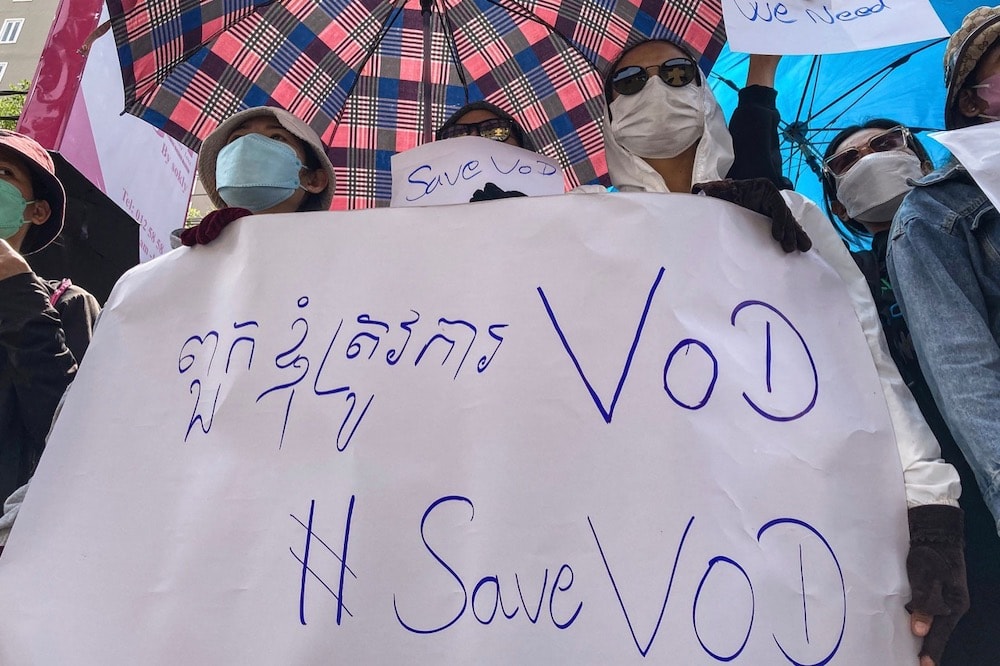Media and civil society groups have criticized the government's revocation of the media license of Voice of Democracy (VOD), one of the last remaining independent media outlets in Cambodia.
This statement was originally published on aji.or.id on 14 February 2023.
We, the undersigned media and civil society organizations, are deeply disturbed by Prime Minister Hun Sen’s order to revoke the license of Voice of Democracy (VOD), one of the last remaining independent media outlets in Cambodia. We also condemn the recent sexual harassment and intimidation of a female VOD journalist.
The closure of VOD and the harassment of a female VOD journalist undermine the government’s own claims regarding respect for the free press in Cambodia and appear to reflect a failure to uphold the 1995 Law on the Press. The decision to revoke VOD’s media license ahead of the July 2023 national elections represents a fresh wave of intimidation tactics against the country’s dwindling independent media that mirrors the 2017 closure of the Cambodia Daily and the 2018 sale of the Phnom Penh Post.
On February 9, VOD published an article in Khmer quoting government spokesperson H.E. Phay Siphan as saying that, “it is not wrong for Hun Manet to play his father’s role in providing aid to Turkey.” H.E. Hun Manet later denied playing that role on his social media, and requested an immediate correction and for VOD to provide evidence of his signature on the document authorizing aid.
On February 11, Prime Minister Hun Sen posted on his Facebook page demanding that VOD issue a public apology to the government and his son within 72 hours, or else he said he would order the Ministry of Information to revoke VOD’s media license. On February 12, Hun Sen made another Facebook post shortening the deadline to 10 a.m., February 13.
Prime Minister Hun Sen’s arbitrary deadline signals a serious threat to all independent media and journalists in Cambodia. Cambodia has existing laws for how to deal with an alleged misquote or factual error in a media report. Article 10 of Cambodia’s Press Law states that people have the right to demand a retraction and reply from a publisher when they believe a statement is false, and a publisher must reply within seven days. There is also a right to sue for defamation and libel.
Prime Minister Hun Sen’s apparent decision to not use this law, and instead revoke the license of VOD, as well as Minister of Information Khieu Kanharith’s subsequent Facebook post declaring it a “lesson” for other media, suggests that the move was made to silence one of the few remaining independent news publications in the country ahead of the national election.
Already, as of the morning of February 13, access to VOD’s websites – both Khmer and English – appears to have been blocked by major internet service providers and mobile service providers within Cambodia.
We call on the government to resolve the issue in a calm, professional and respectful manner that is in line with Cambodian law and that does not do lasting damage to Cambodia’s media landscape. We believe that the closure of VOD would represent a grave step backwards for both press freedom and the rule of law in Cambodia.
Moreover, we rebuke the abusive and misogynistic language used by Mr. Pheng Vannak and others on social media against the female reporter who authored the VOD article in question. We hope the government, through relevant ministries such as the Ministry of Information and the Ministry of Women’s Affairs, will join us in calling for Mr. Vannak and others to apologize to the reporter in question and to stop his blatant acts of sexual harassment directed towards female reporters.
No journalist should ever be attacked as a result of their work or identity.
The role of independent media is indispensable to democracy. The United Nations Human Rights Committee has stressed that a free media is essential to democratic processes and should be allowed to operate without restraint.
We hope the government acknowledges the essential role of VOD and its journalists, along with the remaining independent media outlets in the country, and their right to do their work in accordance with the law and without fear of intimidation and harassment.



